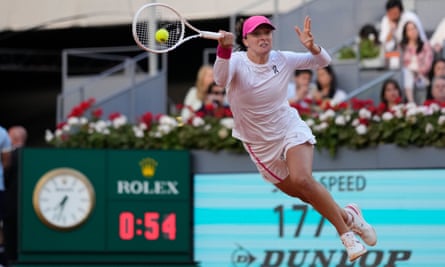Iga Swiatek may still be in the early years of her career, still in the process of learning her craft, gaining new tools while yet to reach her peak, but at the same time she continues to make her mark in tennis’s history books at a startling pace.
At 22, Swiatek has now won every single significant clay court event on the WTA tour, an achievement she earned on Saturday evening by outlasting Aryna Sabalenka in an incredible battle of the highest quality between the two best players in the world. After three hours and 11 minutes in Madrid, Swiatek saved three match points and emerged victorious in a match that will go down in history for its greatness, defeating Sabalenka 7-5, 4-6, 7-6 (7).
The victory marks a 20th career title for the Pole, with three this year and eight of those victories on clay. Having enjoyed her 100th week at No 1 to start the tournament, she leaves with a win that consolidates her dominance on clay having now conquered Roland Garros, Madrid, Rome and Stuttgart.
“A lot of emotions. But for sure I’m really proud of myself and really happy, because when you have matches like that and when you actually have to fight through some stuff, it makes it even better. So I’m really proud of myself,” said Swiatek.
In last year’s final between the top two players, it took one of the greatest performances of Sabalenka’s career to topple Swiatek. This time, after a nervy start, by the middle of set one they had already reached that level. As both women began to serve with greater precision in the decisive moments, they both struck the ball with freedom. While the Belarusian crushed the ball off both wings, her opponent frantically flipped defence to attack with her speed, strength and her ability to open the court with spin.

The first set was ultimately decided by Swiatek’s incredible returning in the final games, but Sabalenka opened it even more determined to land the first strike, snatching an early break by pulverising the Pole’s second serve. Swiatek kept on pulling her back in with her own immaculate returning, but some great serving from the world No 2 kept her narrowly ahead. At 5-4, she laid everything on the line, breaking for the set with a running forehand winner.
By the final set, both were fighting for their lives, fully aware that nothing but the best would suffice. First Swiatek reeled Sabalenka back from her 3-1 lead, then he Belarusian pulled off an unbelievable hold from 30-0 down at 4-4, firing down a second serve ace at 30-30. When she pushed forward and generated match points on Swiatek’s serve at 6-5, the Pole saved both without hesitation to force a tie-break. On Swiatek’s first match point at 6-5 in the tiebreak, Sabalenka fired down an ace.
“I was, like, ‘Okay, whatever. It’s not the first time in my life. I’m just going to go for it,’” said Swiatek on facing the match points. “I decided to play a fast serve, a big one. So I wanted to be courageous in that moment. When it came to the tie-break, I was kind of alive again, because I thought it was going to be over during the set.”
It was an unbelievable match, back and forth until the very end, and decided by incomprehensibly small margins as Sabalenka fired a backhand long on championship point to finally relinquish the title. “I think it was the most intense and crazy final I played,” said Swiatek. “Out of every match [in my career], hard to say, but a final makes it even more crazy.”
While Sabalenka was understandably frustrated after such a devastating loss, she also expressed pride at rediscovering her form after a tough few months since her triumph at the Australian Open: “I’m going to suffer for a day, and tomorrow I’m leaving to Rome, so I’m going to forget it quickly,” she said. “It’s my birthday tomorrow. I hope I’m going to be in a good mood. But it’s a tough one. It’s a tough one to accept. But at the same time, it’s not like you lost the match easily and you didn’t do your best. I gave my all today, and I can be proud of myself, and hopefully, like we spoke on the court, next year it goes to my side.”
As another spectacular women’s match played out on Estadio Manolo Santana, it was hard not to think of the players’ frustrations with what they feel is inferior treatment at the tournament, including last year’s women’s doubles final, where the players were not allowed to speak in their trophy ceremony. It was evidently not far from Swiatek’s mind: “Who’s gonna say now that women’s tennis is boring, right?” she said.
How the tables have turned. While three of the past four men’s matches have been decided by retirements or walkovers and the top three seeds – Jannik Sinner, Carlos Alcaraz and Daniil Medvedev – all left Madrid injured, it is the women who have provided most of the entertainment in the second week. This match had already been preceded by Sabalenka pulling off an incredible comeback to defeat Elena Rybakina in a final set tie-break.
In the end, these finals days of the tournament have been a reminder of the dual importance of both sets of players, how well the men’s and women’s tours balance each other out in these combined events and particularly of the supreme skill and sky-high performances of the top women as they continue to solidify their rivalries and push each other to new heights.
Source: theguardian.com


















